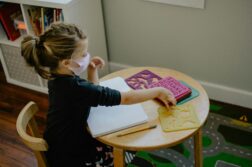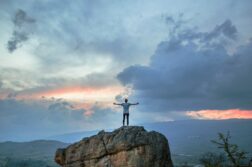
June is Pride month for the LGBT community. It is also the month in which I was born, but pride was absent from my moral dictionary. Growing up as a gay man in a macho society erased that pride. Masculinity made me struggle with society, school, friends and family. I only had self-loathing. Masculinity is one of the issues one starts talking about, but not until it has caused lots of emotional distress.
From the beginning, my journey was filled with strife I battled every day with my appearance, my voice –– everything about me. My sharp and high voice sounded too feminine for my mother that her protectiveness deprived me of the freedom to play with boys. She didn’t want me to be humiliated. There was something about me those boys tried to suppress. They saw it, but I could not. I was too young to understand that I was different. I could not fix what they thought was alien about me. I was too young to understand rejection for being feminine.
My father’s scowls and stares were scary enough to make me freeze out of fear that I had done something wrong. My mother’s sudden smacking of my hands to defeminize my body language confused me. I had to look around me, then consult my brain twice to engage my body in communication. My body got disconnected from reality. There is no harmony in and about your body if what you say and feel cannot be reflected in a genuine body language. You are simply not you. This is the difference between being you and wearing a mask.
I was that boy whose body was shackled by toxic masculinity. I was that boy, wearing a mask on a stage performing for a too large audience that I could handle, called society. In that experience, I punished my body, and it punished me in return. I shackled it, and it shackled my identity in return. There was no one to talk to for me to see it. The social mirror where I could see myself was cracked and distorted. I looked broken in that mirror. I looked distorted. There was no way it was possible to fix myself. I was a sinner.
Something felt heavy on the top of me. Some people may call that burden fatigue or depression. But mine was called fear. I could hear the voices of boys at school calling me names. Those voices would not leave my ears. They were like morning chants of angry rooks. They simply made me glued to my bed, and unable to face the world outside.
I was a sinner.
Toxic masculinity allowed boys to feel superior to girls. It allowed them to speak on my behalf and tell me to be a man. It allowed teachers to keep silent sometimes on such bullying and blame the victim. It is what masculine and macho societies destructively pass on to schools from one generation to another. It excludes non-confirming masculinity. It excluded boys like me to have the joy of being in school and learn to build a fair society. It will continue excluding those who try to wriggle their way out the maze of traditions and dogma, sadly.
I was 18 years old when I realized I could not fix myself, yet there was no way for me to be free to be who I was. What was freedom then? To embrace who I was, though it was at odds with society, or suppress it and suffer? None of those options were likely to bring me to peace with myself and reconcile with my lost identity. It was like looking for something I did not know what it was yet wanted it so badly.
Being 18, I was mature enough to be concerned about why I could not be with a girl. I was mature enough to disagree with my Islamic Education teacher about the Story of Lut. Yet I could not give voice to my concerns and disagreement. I was mature enough that I could not see myself in the image of a sinner from the Story of Lut. I was mature enough to not discuss my concerns with my mother, including her how wrong religion was about people like me. I was mature to keep quiet and not make her scared of the troublemaker I was becoming. I was beginning to lead a life without believing in sin.
That teacher taught that homosexuals, Christians, Jews, Buddhists and atheists will go to Hell. They are sinners, he said. If that was not a pure arrogance of a masculine order, then what is arrogance? If judging people for being different and condemning them is not a sin, then what is a sin? If there is anything called a sin, then macho societies are the biggest sinners.
Sin is a symbol. It is another construction of violent masculinity. It is a metaphor for macho society. Sin made me fear Christians, atheists and be ashamed of who I am. If rejecting me was not equally called a sin, why believe in sin?
When I stopped believing in the concept of sin, I was able to meet people like me. I was able to move on and progress. I was able to love, live and let live. Create that harmony in you. Don’t shackle your body for outdated irrelevant norms. Build a world from your own perspectives, but to do so, be yourself and embrace that identity. I wish I was able to utter that a long time ago, but I am no longer a sinner.
Samir El Mouti, a women’s rights and LGBTQ+ activist, is studying Women’s and Gender Studies in the UK.







Discussion4 Comments
Well Samir, you hit the nail on the head with the enforced lifestyle projected onto me as a youngster and a teenager. My lack of MACHO mannerisms were from a farming, ranch and horse family. None of those were in me. Perceived as the Black Sheep for wanting out of that tradition. I grew stronger to myself when announcing proudly that I am also the Pink Sheep! My career is a professional Painter & Sculptor, not a farmer! It is matter of fact that so many others have experienced this ignorance to let people be themselves. “Who is it hurting? “US”.
I think that both you, Wesley and Samir, as well as hundreds of thousands of other gay men, young, middle-aged and old would be helped by a book written by Alan Downs, PhD, called The Velvet Rage, Overcomng the Pain of Growing Up Gay in a Straight World (Second Edition). It is not an easy read, but one that is very powerful and meaning.
I liken growing up in a straight world to I am Venus, the straight world is Mars. And because we are a minority, we are expected to pick up the slack and figure out what the straights are talking about, and why. No one hands us a guide book, or a de-coder, to make it in this straight world; so we survive by our internal instincts and our wits. Thus we have different experiences in life and have so much to offer the straight world…art, culture and humor, plays, music, architecture, good food and a way to live in a struggling world. Thank you both for sharing your stories. They add to our collective power! Truth to power!
Samir, thank you for writing. Your perspective on toxic masculinity is one many of us recognize. No matter where we travel, we find instances when “hardening of the categories” is apparent, with individuals unable to be themselves due to cultural limitations. In many societies, it is not possible to escape these limits. But for some of us able to move to another country (and a more diverse culture), we discover who we are as authentic members of the human family. We have to retain empathy for those who are not able to find a more hospitable environment to explore their uniqueness.
27 March 2020 — Samir, thank you very much for sharing your experience. One person, one place, one religion, which you have universalized. If only we could etch your essay onto the tombstone above the grave where we need to bury that b.s. expression: love the sinner but not the sin. Thanks again.